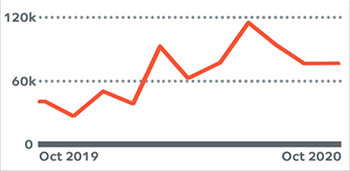COVID-19 has dominated this year’s wellbeing agenda. Some of the UK’s most-Googled terms – including lockdown, furlough and social distancing – rarely entered our vocabulary in the pre-pandemic world. All across the internet, people have been searching for answers and reaching out to support those around them.
Using search data, survey feedback and social media trends, we’ve created the 2020 Wellbeing Roundup, a short report exploring a year of health and wellbeing in UK homes and workplaces. Here are some highlights from our findings.
Employees are still looking for help with homeworking
While many businesses have now adapted to remote working, employees are seeking on-going support not only with their wellbeing, but also with logistics and practical issues.
Working environments differ massively between households, causing friction in some organisations. According to our Divided Together report, 42% of people feel that videos calls reveal that their colleagues have better home-working spaces.
‘Ergonomic chair’ – Google search term popularity

Searches for ‘ergonomic chair’ are at an all-time high. While many remote workers set up their home offices in the spring, searches for ergonomic chairs are still rising. As homeworking continues, employers should take an active role in workspace set-up to help reduce absences due to back and neck pain.
In addition, IT queries remain high on the agenda. Google searches for ‘how to use Zoom’ peaked in April but are still up 2393% on the end of last year. Managers should be on the look out for different levels of IT-literacy and offer extra support for employees who may be struggling with tech.
Workplace support must continue to adapt
Workplace support remains a hot topic for both employees and HR teams. This year’s searches show that workplace morale, mental health support and people management are key focus areas which can help lead your team to success.
‘COVID-Safe’ – Google search term popularity

While most employers have dedicated time and resources to making their workplace COVID-safe (also known as COVID-secure), search volume for these terms remains high, implying a level of anxiety amongst those going into work throughout the pandemic.
Business leaders should consider if there’s more they can do to improve workplace safety, reassure their employees or offer alternative working arrangements.
‘Mental Health First Aid online course’ – Google search term popularity

Interest in Mental Health First Aid courses increased by over 800% in the summer and remains far higher than pre-pandemic levels.
According to a study by Mind, over one in five adults with no previous history of mental health difficulties now report that their mental health is poor or very poor. Yet only 41% feel comfortable bringing this up with their manager, so employers are likely to see mental health awareness stay high on the corporate agenda in the future.
Anxieties are high but our outlook is changing
Support through these difficult times is vital for employee wellbeing. Leadership and HR teams must prioritise communication and transparency to build trust within the workforce and manage staff anxiety.
‘Redundancy’ – Google search term popularity

Searches for ‘redundancy’ shot up in the spring and are still almost double their pre-COVID level. This search trend reflects redundancies reaching a record high of 314,000 in the three months to September 2020.
Even back in May, almost 6 in 10 HR leaders anticipated a recession which would negatively impact their organisation, and economic uncertainty looks set to exacerbate this concern well into 2021.
Despite this, it seems attitudes are beginning to change. The Divided Together reportfound that 62% of HR leaders think employees will prioritise wellbeing over salary in the future. With flexible workplaces setting themselves apart from the competition, we could see a generation of employees who put their wellbeing before the rat run.
Workplace wellbeing could be one of 2020’s triumphs
Almost a quarter of respondents in our Divided Together research said they’d like more general wellbeing and mental health support from their employer, with 19% saying they’re also looking for physical wellbeing support.
‘Wellbeing’ – Google search term popularity

Interest in wellbeing as a whole has almost doubled since 2016, and as online conversations about mental health, whole-body wellness and workplace support continue to rise, the data suggests a shift in priorities which is more than a passing phase.
While COVID-19 has highlighted health and wellbeing issues like never before, searches for these terms have been increasing year on year. If employers can invest in wellbeing and help their people grow, they will see their businesses recover and thrive in the new year.
2020 has seen our home lives and workplaces transformed, and now more than ever people are looking for answers and support both in and outside the workplace. View the full 2020 Wellbeing Roundup to find out how you can best support your employees through these turbulent times.